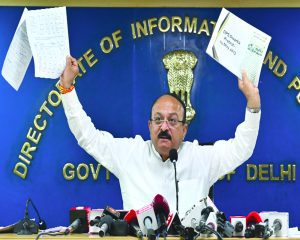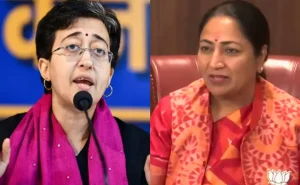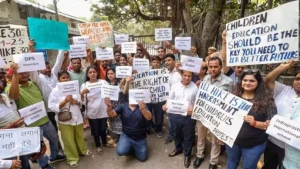New Delhi – A major legislative move is on the horizon as the Delhi government prepares to introduce the Delhi School Fee Regulation Bill in a special session of the Delhi Assembly. This anticipated Delhi School Fee Regulation Bill, aimed at addressing the growing concern of arbitrary fee hikes by private schools, could bring a long-awaited change for thousands of parents across the Capital.
The Delhi Cabinet recently approved the draft of the Delhi School Fee Regulation Bill, and the government is now planning to convene a two-day special Assembly session, likely scheduled for May 13 and 14, to table and debate the proposal. This development comes after more than a year of mounting public pressure and protests by parents frustrated by rising school fees.
Government Pushes for Fee Transparency

The Delhi School Fee Regulation Bill is being introduced to establish structured guidelines for fee hikes in private schools. It applies to all 1,677 aided and unaided private schools in Delhi. The draft Bill outlines a legal framework that mandates transparency in how schools set and increase fees, with penalties reaching up to ₹10 lakh for violations.
Chief Minister Rekha Gupta, who announced the Cabinet’s approval of the draft Bill on April 29, emphasized the government’s intent to curb arbitrary practices. “We want to ensure a fair process in school fee structures. The Delhi School Fee Regulation Bill will fix clear procedures, and schools will be accountable for any unjustified hikes,” she said.
This initiative aims to balance the interests of private institutions with the financial concerns of families, many of whom have found it increasingly difficult to keep up with rising educational costs.
Special Assembly Session Set for Mid-May
The decision to table the Delhi School Fee Regulation Bill in a special Assembly session was discussed during a BJP Legislature Party meeting on Sunday. The meeting, chaired by Assembly Speaker Vijender Gupta, was attended by Chief Minister Gupta, Education Minister Ashish Sood, and other Cabinet ministers and MLAs.
Sources from the meeting confirmed that the special session is likely to take place on May 13 and 14. Apart from deliberating on the Delhi School Fee Regulation Bill, the session will also touch upon monsoon preparedness and review the government’s performance across sectors.
According to Education Minister Sood, “This session is crucial for tackling the long-standing issue of fee transparency. The Delhi School Fee Regulation Bill will give parents clarity and schools a structured system to follow.”
Opposition Voices Transparency Concerns


While the government’s intentions are clear, the process has drawn criticism from opposition leaders. Atishi, the Leader of Opposition, expressed concerns over the lack of transparency in drafting the Delhi School Fee Regulation Bill. In a letter to the Chief Minister, Atishi pointed out that a Bill aimed at promoting transparency should itself be developed in a transparent manner.
“It is ironic that the Delhi School Fee Regulation Bill, which seeks to introduce a transparent fee regulation mechanism, has been pushed forward without proper public scrutiny,” Atishi stated. She called for a public presentation of the draft in the Assembly to allow for broader discussion and refinement.
Despite these criticisms, the government remains committed to passing the Bill swiftly, citing urgent parental concerns and widespread dissatisfaction with the current unregulated system.
Parental Protests Spark Legislative Action
The Delhi School Fee Regulation Bill is a direct response to consistent protests from parents across the city. Over the past year, numerous demonstrations have been held demanding stricter rules against unjustified school fee hikes. These protests intensified in recent months, putting pressure on the administration to act.

On Saturday, a group of parents gathered at the Delhi Secretariat to meet Chief Minister Rekha Gupta and Education Minister Ashish Sood. The meeting focused on the proposed Delhi School Fee Regulation Bill and its impact on educational affordability.
During the discussion, Chief Minister Gupta acknowledged the scale of the problem and the government’s obligation to resolve it. “There will be a backlog, but we are committed to ensuring that no parent has to live in constant anxiety over their child’s school fees. The Delhi School Fee Regulation Bill is our promise of accountability,” she told the attendees.
What the Bill Proposes?
The Delhi School Fee Regulation Bill includes several provisions aimed at ensuring fairness and transparency. Key aspects include:
-
All private schools must submit proposed fee structures to a regulatory committee.
-
Schools will require prior approval before implementing any fee hike.
-
Any hike must be based on audited financial records and justifiable operational costs.
-
Non-compliance could result in penalties up to ₹10 lakh.
-
A grievance redressal mechanism will be established for parents.
These measures are expected to standardize fee structures and bring an end to the sudden, steep hikes that have become common in many institutions.
Implementation Challenges Acknowledged
While the Delhi School Fee Regulation Bill promises long-term reform, the government has admitted that immediate implementation could be complex. Transitioning from the current system to a regulated framework will require coordination with private institutions, administrative changes, and new monitoring mechanisms.
Chief Minister Gupta noted that while the framework would take time to implement, its long-term impact would be significant. “The Delhi School Fee Regulation Bill is not just a law, it is a cultural shift in how education is managed in Delhi,” she said.
Political Stakes and Public Expectations
The Delhi School Fee Regulation Bill also carries political weight. As education remains a sensitive issue for Delhi’s middle class, the government’s ability to deliver tangible reforms could influence voter sentiment. By fast-tracking this Bill, the ruling party seeks to position itself as a champion of parental rights and education fairness.
Education Minister Sood remarked, “We are working to deliver not just promises but actual results. The Delhi School Fee Regulation Bill reflects our long-term vision for an accountable and equitable education system.”
However, critics argue that the Bill must be subject to wider public consultation to ensure it does not lead to unintended consequences, such as affecting the operational viability of private schools.
Future Implications
If passed, the Delhi School Fee Regulation Bill could serve as a model for other Indian states grappling with similar issues. It represents a significant policy shift and a test case for how governments can regulate private education without stifling institutional independence.
Parents across Delhi await the Assembly’s decision, hoping that the Bill will mark the beginning of a more predictable and transparent educational environment. Meanwhile, schools are cautiously observing the legislative process, anticipating new compliance requirements and oversight protocols.
As Delhi prepares for the special session, the Delhi School Fee Regulation Bill stands at the center of a broader debate about education, governance, and accountability.

